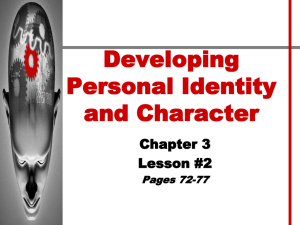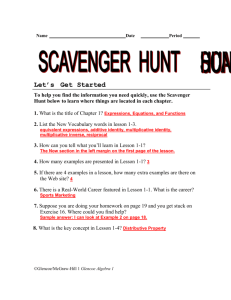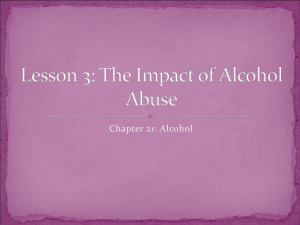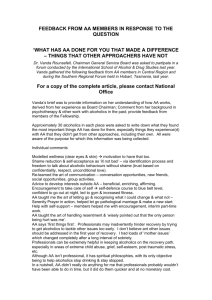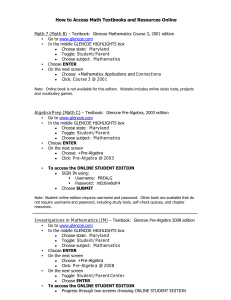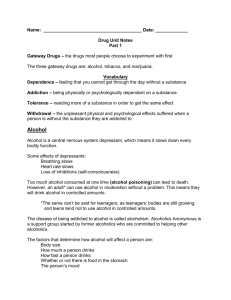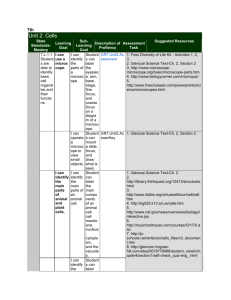Alcohol
advertisement
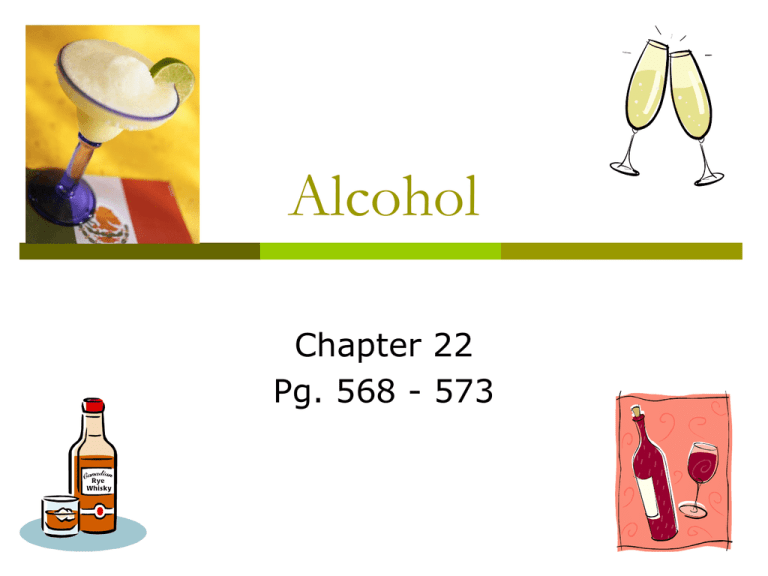
Alcohol Chapter 22 Pg. 568 - 573 Harmful effects of alcohol use Objective 1: Describe the short-term effects of alcohol use. Objective 2: Discuss the consequences of drinking and driving. Objective 3: Explain the dangers of drug/alcohol use. Objective 4: Develop refusal strategies concerning alcohol use. Vocabulary pgs 571-578 Binge drinking Alcohol poisoning Fetal alcohol syndrome Alcoholism Alcoholic Recovery Sobriety Bodies not designed to handle alcohol Run time 6:09 Binge Drinking Drinking 5 or more alcoholic drinks at one sitting. Problem among young people Dangerous because it is possible to consume a fatal dose of alcohol Alcohol Poisoning Since alcohol is a depressant, it shuts down involuntary actions such as breathing and the gag reflex that prevents choking. Effects of alcohol poisoning pg 573 Passing out. Problem is still there because alcohol is still in the stomach and continues to enter the blood stream. Don’t always assume that someone is sleeping it off. http://www.nbcchicago.com/video/#!/news/local/22Warrants-Issued-After-NIU-Fraternity-Death/183884271 Symptoms of alcohol poisoning Mental confusion, coma, vomiting, and seizures Slow respiration-10 seconds between breaths or fewer that 8 breaths a minute Irregular heart beat Hypothermia or pale or bluish skin color Sever dehydration from vomiting Call 911 immediately if someone may have alcohol poisoning Long term effects of alcohol SEE FIGURE 22.3 on page 575 Effects of alcohol video clip: http://video.foxnews.com/v/2155575655001/s tartling-new-study-on-alcohol-use-in-america/ Alcohol during pregnancy Fetus liver not developed to handle alcohol and is especially dangerous to baby CNS Ex. Babies born with a small head and deformities of the face, hands or feet. Heart, liver, and kidney defects and well as vision or hearing problems. FAS is the leading known cause of mental retardation in the United States. Preventable Addiction Run Time 6:18 Alcoholism Some display violent or aggressive actions and others may become quiet and withdrawn. Some health problems that may develop include cirrhosis of the liver and brain damage. Alcoholics may display these symptoms Craving Loss of control: can’t limit number of drinks Physical dependence: may experience withdrawal symptoms (nausea, sweating, shakiness, and anxiety) Tolerance Health, family, and legal problems: suffers repeated injuries, drunk driving citations, poor relationships Factors affecting alcoholics Growing scientific evidence suggest genetic link. Children of alcoholics are 4 times likely to become alcoholics. Other factors are: family, friends, culture, peer pressure, availability of alcohol, and stress. Effects on family and society Estimated 14 million alcoholics in the USA today. Alcohol use is a major factor in the 4 leading causes of accidental death: car crashes, falls, drowning, and house fires. 40% of violent crimes are alcohol related ½ of all homicides 2/3 of domestic violence reports. Enable: allows the alcohol abuse to continue Online Crossword Puzzles http://www.glencoe.com/olc_games/game _engine/content/gln_health/glencoe_healt h/crosswords/ch22a/index.html http://www.glencoe.com/olc_games/game _engine/content/gln_health/glencoe_healt h/crosswords/ch22b/index.html Interactive study guides http://glencoe.mcgrawhill.com/sites/dl/free/0078726549/360003 /InterActCh22Ls2.html http://glencoe.mcgrawhill.com/sites/dl/free/0078726549/360003 /InterActCh22Ls3.html
